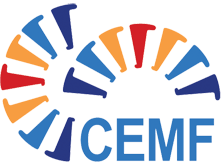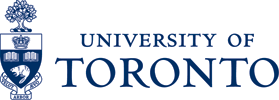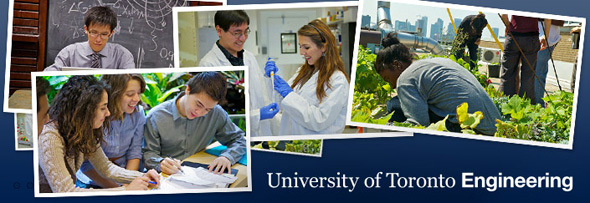The Faculty of Applied Science & Engineering at the University of Toronto has earned a national and international reputation for excellence, with a focus on interactive and collaborative research and design. Our engineering programs increasingly reflect global, business and environmental concerns.
University of Toronto Engineering provides an unparalleled education to its students and yields some of the world's most ground-breaking engineering research. Established as the School of Practical Science in 1873, University of Toronto Engineering currently ranks first among engineering and technology schools in Canada, and among the best in the world. It is home to approximately 230 faculty members, 1,600 graduate students and 4,850 undergraduate students.
Our Programs
Our Faculty offers a breadth of degree programs that graduate world-class engineers. Our curriculum includes major, minor and certificate options, through the following Departments, Divisions and Institutes:
• Department of Chemical Engineering & Applied Chemistry
• Department of Civil Engineering
• The Edward S. Rogers Sr. Department of Electrical & Computer Engineering
• Department of Materials Science & Engineering
• Department of Mechanical & Industrial Engineering
• Division of Engineering Science
• Division of Environmental Engineering & Energy Systems
• Institute of Biomaterials & Biomedical Engineering
• University of Toronto Institute for Aerospace Studies
U of T Engineering strives to graduate successful students. Here, students have access to our unique curriculum, taught by our internationally renowned scholars, as well as a broad range of co- and extra-curricular activities. Together, these underscore U of T Engineering's commitment to educating global engineers, equipped to deal with the world's most pressing challenges.
In September 2011, we launched the unique-in-Canada Engineering Business minor. This popular minor enables students to explore and learn how modern engineering business functions. In the same year, we launched the Robotics and Mechatronics minor, which allows students to delve into fundamental enabling technologies that render robotic and mechatronic systems into viable consumer products. In addition, we further expanded our certificate offerings. They include Engineering Business and Global Engineering, and in September 2012, in Mineral Resources, as a part of a larger suite of Engineering undergraduate minors and certificates.
Our Mentors and Leaders
The University of Toronto Engineering has a long and proud history of women mentors and leaders. From the early years of the Faculty to now, our female professors, graduates and students have left an indelible mark on the world, affecting positive change.
We are proud of our diversity, as more than a fifth of our undergraduates are women, while nearly a quarter of our graduate students are women. We are committed to continuing to increase those numbers, as women leaders within the U of T Engineering community help cultivate the world's next generation of creative thinkers and problem-solvers.

Dean Cristina Amon
Over the course of her 20 years in the engineering profession, Professor Cristina Amon has been a remarkable role model. As our Faculty's 13th Dean and our first female Dean, she is actively committed to gender diversity in engineering.
In 2011, she was honoured with the Society of Women Engineers' (SWE) highest honour, the SWE Achievement Award. Also in 2011, Dean Amon was named a Woman of Distinction by YWCA Toronto for her contributions to improving the lives of girls and women.
In 2010, Engineers Canada honoured Dean Amon with the Award for the Support of Women. She also received the 2009 Heat Transfer Memorial Award by the American Society of Mechanical Engineers for her pioneering contributions to the field, including heat transfer enhancement techniques.
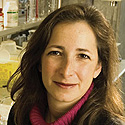
Professor Molly Shoichet
Another prime example is Chemical and Biomedical Engineering Professor Molly Shoichet. She is a member of the Order of Ontario, in recognition of her world-renowned research into regenerative medicine. She is also a Fellow of the American Association for the Advancement of Science, as well as a Fellow of the Royal Society of Canada.
Her research focuses on strategies and materials to help the body heal itself after traumatic injury, in particular to the brain and spinal cord. Her discovery of a new method for creating 3D hydrogel scaffolds, which will aid in the development of new tissue and organs grown in a lab, was published in Nature Materials in 2011.
Professor Shoichet continues to make significant contributions to literature in her field of study, which The Society for Biomaterials honoured her for in 2012, with the Clemson Award.
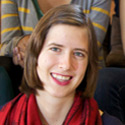
Hanna Janossy
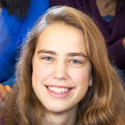
Lea Janossy
The Janossy Sisters
Industrial Engineering students Hanna Janossy and Lea Janossy received the Canadian Engineering Memorial Foundation (CEMF) Vale Undergraduate Scholarship and the CEMF Engineering Ambassador Scholarship – Ontario Region for 2012, respectively.
“We are fortunate to have strong role models growing up, since our mother and grandmother are engineers,” said Lea. “We now have the opportunity to be role models and to show young women that there are boundless opportunities in this field.”
Both Hanna and Lea serve as Co-Presidents of Women in Science and Engineering (WISE) at U of T, an organization that aims to empower and connect women in the fields of science and engineering through mentorship and consultation.

Kristin Foster
Kristin Foster, a Lassonde Mineral Engineering undergraduate, hopes to see more and more female students in her program. Mineral engineering is a highly versatile and interdisciplinary field, and Foster was able to explore it during her Professional Engineering Year (PEY) placement in 2011. Working at North American Palladium, a small mine just outside Thunder Bay, Ont., she participated in everything from production blasting to designing mine plants with project managers.
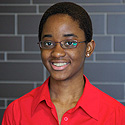
Evelyn Mukwedeya
Evelyn Mukwedeya, a 2011 Engineering Science graduate, was recognized with a number of awards for her outstanding leadership and contributions to U of T Engineering while a student. In 2011, she was the recipient of U of T’s Gordan Cressy Leadership Award, and received a Canadian Engineering Memorial Foundation (CEMF) Scholarship for Women in Engineering in 2010. Also in 2010, she was honoured with the William Peyton Hubbard Memorial Award for black university and college students. During her time at U of T Engineering, Evelyn took a leading role in engineering organizations on campus, including WISE and the Asian University for Women Cyber-mentorship program, which matches female students at University of Toronto with new students at the Asian University for Women in Chittagong, Bangladesh.
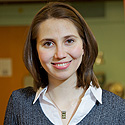
Audrey Kertesz
Audrey Kertesz is one of many female engineering students whose research is addressing the world’s most important issues. Audrey, an MASc student in Electrical & Computer Engineering, is the winner of the Natural Sciences and Research Council of Canada's 2010 André Hamer Postgraduate Prize. Her research is finding ways to improve the efficiency of urban-based solar panel arrays by designing better control systems that operate at peak efficiency, resulting in an increased supply of renewable energy.

Bev Bradley
A trip to Gambia changed the course of PhD student Bev Bradley’s research career. There, Bradley saw first-hand the need for a reliable supply of medical oxygen in a low-resource country.
For her Gobal Engineering PhD thesis, she is faced with an extremely complex challenge. To create technology that provides hospitals in developing countries with accessible and efficient medical oxygen, she must consider a country’s unreliable power system and its ability – or lack thereof – to transport equipment and maintain supplies.
She and her team are, in turn, developing a battery-powered version of an oxygen-generating machine, which can last up to 20 hours without power.
Our Initiatives
At U of T Engineering, we are committed to inspiring girls to be the engineers of tomorrow. Here is a look at just a few of our many outreach initiatives that aim to give young students the tools they need to pursue engineering at U of T.
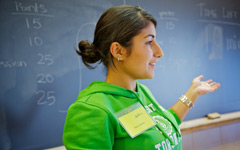
Go ENG Girl!
Each year, engineering schools across Ontario host Go ENG Girl!, an event that gives girls in grades seven to ten the chance to explore opportunities in engineering through a number of hands-on activities. At U of T Engineering, our committed female students mentor the more than 100 girls who participate each year.
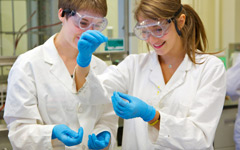
DEEP
University of Toronto Engineering's innovative outreach programs include the Da Vinci Engineering Enrichment Program (DEEP) Summer Academy, which provides gifted and highly motivated high-school students from across the world with the opportunity for advanced study in a variety of engineering, technology, business and science disciplines.
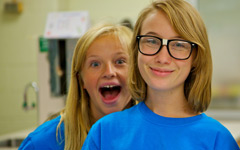
Girls’ Jr. DEEP
At U of T Engineering, we aim to inspire the next generation of female engineers. Girls’ Jr. Deep is an opportunity for girls in grades four to eight to develop their engineering interests and leadership skills through hands-on engineering activities, challenging labs and interactive lectures.
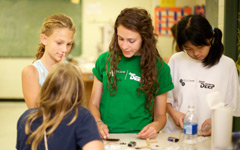
Girls’ Science & Engineering Saturdays
Girls' Science & Engineering Saturdays welcome young women currently enrolled in grades five through 12 to participate. Held every Saturday in January, our enthusiastic female undergraduate and graduate students instructors lead and mentor each session.
Get to Know Us
The best ways to learn more about U of T Engineering is to visit our campus and Faculty website: http://www.engineering.utoronto.ca.
Please contact us for a tour or to attend one of our upcoming events:
https://discover.engineering.utoronto.ca/
